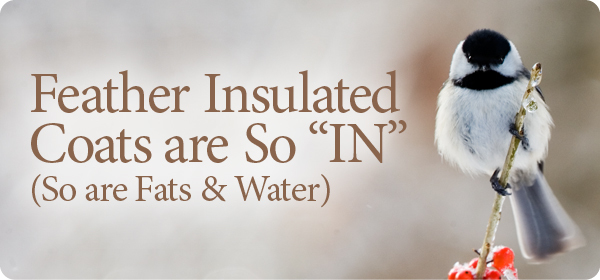
How to Help Birds Survive Cold Weather
Surviving Winter, the Bird Way
Just as we rely on coats, hats and mittens to keep us warm in the face of winter's icy grip, survival can be made easier by providing food, a heated, open source of water and protection from the elements.
What they do
Most birds will adjust their feathers to create air pockets that will help them keep warm. You will often notice the birds look fatter or "puffed up" during cold weather. This is because the birds are fluffing up their feathers; the more air space, the better the insulation.
Some birds perch on one leg at a time, drawing the free leg to their breast for warmth. Most birds will shiver for short term adjustments to the cold. Shivering converts muscular energy into heat for the short term, but the energy must be replenished shortly thereafter.
Food
Typically, your feeders serve as a supplemental food source for birds. In contrast, during periods of extreme cold and severe winter weather, your birds may switch to using your feeders as a critical source of food that enables them to survive from day to day. So make sure your foods provide them with quality, high-calorie, fatty foods that will give them the extra energy they need to survive.
You can play a vital role, as feeding the birds becomes critical when extremely cold conditions occur. At these times, a reliable supply of energy-heavy food can mean the difference between life and death for a bird. To stay warm, birds will expend energy very quickly, some losing up to 10% of their body weight on extremely cold nights. Food is the most essential element, providing birds with the energy, stamina and nutrition they need. An ample supply of high-calorie foods such as our WBU suet, Bark Butter® Bits, sunflower, nuts and more is crucial to a bird’s survival.
Water
A reliable, open source of water is also important. Birds continue to need a source of water for drinking to maintain their metabolism during dry, cold weather. Clean feathers help birds stay warm, and a bird bath is often the only way for some birds to drink and keep their feathers in top condition when it’s cold.
When our temperatures stay below freezing, finding a water source becomes more difficult when most everything is frozen. Adding a birdbath de-icer can solve this problem, offer your birds a water source and help prevent your birbath from freezing and cracking.
Shelter
Have a nest box up? This summertime home will be used during the winter as a roost box. You may see several birds of the same species flying in and out of the birdhouse. As we encounter inclement weather, a small group of birds may seek shelter in safe surroundings often huddling together for the night. We have had reports of a single Downy Woodpecker spending the night and others have reported seeing Chickadees and I have seen several Bluebirds using my nest box.
Stop by our store for more expert advice, a way to offer water during the freeze, and quality foods that are worth the weight to help your birds thrive this winter.

